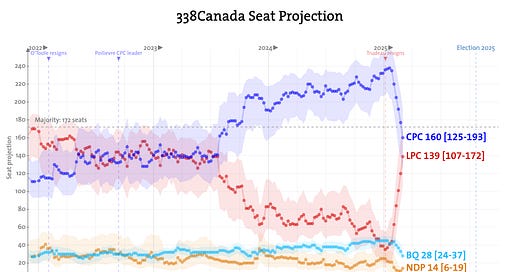Mark Carney, Tariffs, and the Great Canadian Plot Twist: How Trump May Have Accidentally Saved the Liberals
The Election Was About Soft Identity Politics—Then the Real World Kicked Down the Door. Trump Threatens, Canada Rallies—And Suddenly the Liberals Are Back in the Game.
In the fast-evolving theater of emotion that is Canadian politics, recent polls have taken a dramatic turn, reflecting a nation poised at the crossroads of economic sovereignty and leadership. The cause? A mix of external pressures and the emergence of a compellingly Canadian figure—Mark Carney.
Not long ago, the Conservative Party, under Pierre Poilievre, seemed destined for a decisive victory, buoyed by public dissatisfaction with Prime Minister Justin Trudeau's administration. However, the political landscape shifted abruptly with U.S. President Donald Trump's threats to impose steep tariffs on Canadian goods and even hints at annexation. These provocations have ignited a surge of nationalistic fervor among Canadians, leading to a remarkable resurgence in support for the Liberal Party.
Today the most pressing issues for Canada seem to be fundamentally economic and technocratic in nature rather than the soft issues both the left and right have been peddling in.
Enter Mark Carney, the former central banker with a reputation for adept crisis management. His entry into the Liberal leadership race has been nothing short of galvanizing for the naturally centrist Canadians.
In Canada maybe more than anywhere, the silent majority doesn’t make noise, they make history.
Polls indicate that with Carney at the helm, the Liberals have not only closed the gap but, have probably edged ahead of the Conservatives. This week’s 338 poll of polls captures the change. What started as a bump is now a clear trend line. Carney's leadership could position the Liberals in a neck-and-neck race with Poilievre's Conservatives at least. And if the trend holds could launch Craney into the biggest come-from-behind victory for a person who has never held elected office in Canadian history.
This shift underscores a broader narrative: Canadians are gravitating toward a technocratic and economic solution rather than a slogany jet-propelled departure from form. With Trump's tariff threats looming large, the electorate's focus has pivoted from traditional partisan issues, and even important housekeeping issues… like literally housing and the cancerous growth of the federal government… to matters of economic resilience and technocratic competence. Carney's financial acumen and international experience resonate with a populace seeking stability amidst external economic threats.
In essence, the dramatic fluctuations in recent polls can be attributed to a perfect storm of external economic pressures and the timely emergence of a leader whose expertise aligns with the nation's pressing concerns. As Canada stands on the precipice of potential economic upheaval, the electorate appears to be placing its trust in seasoned stewardship to safeguard the nation's interests.
And really, did anyone like anything about Pierre Poilievre except that he was the anti-Trudeau sent by central casting to play the sympathetic villain?
With Trudeau now well and truly out of the story what are the issues that will define this Canadian election? Here’s my guess:
Economic Concerns: Despite low unemployment and GDP growth, many voters felt financial strain due to high living costs, including housing, healthcare, and childcare. This disconnect between economic indicators and personal financial experiences led to dissatisfaction with the incumbent party.
Inflation: GDP per person is in steep and sustained decline in Canada. Persistent inflation outpacing wage growth eroded purchasing power, leading to voter frustration. Historically, sustained cost-of-living increases have negatively impacted the party in power.
Alienation of Working-Class Voters: The Liberal Party's perceived focus on cultural issues over economic concerns alienated working-class voters.
Immigration Policy: The party's handling of immigration… is bad. The foundation is not sound, the idea is wrong, it didn’t count what counts, and it hurt everyone - Canadians and immigrants alike. And it’s a major factor in driving down our GDP per person cause… that’s how math works.
Loss of Young Male Voters: A significant shift occurred among young male voters, particularly Gen Z men, who are increasingly moving toward the Burn it all F#$%ing Down Crowd. Factors include economic pressures, the vilification of traditional masculinity, and the Liberal Party's cultural and messaging failures.
The Cost and Productivity of Government: People just want more back for their taxes. The 40% plus growth in the size and cost of government during the Trudeau years resulted in less help, and poorer service. Nobody likes that… except the ideologically aligned Federal Workers who the Liberals are depending on to leave their traditional NDP camp and vote Liberal - now as an anti-Poilievre vote to (they imagine) save their “bullshit” job, as David Graeber would describe them.
Perceptions of Competence: We will see to what degree Trudeau’s perceived incompetence may have undermined voter confidence in the party and its leadership. We voted for a symbol of Canadiana and hope for the future. We got what we paid for, but then changed our minds and wanted to speak to the manager. Is Mark Carney that manager that charms our inner Karen, and makes us a good offer to send us away happy? We’ll see.







